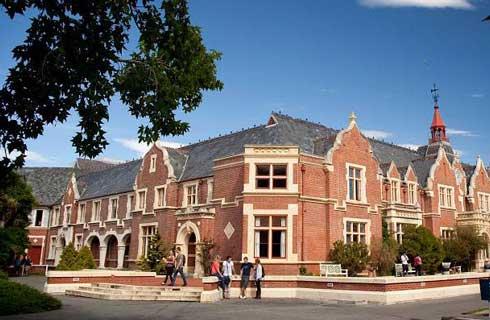环境与资源经济学硕士
Master of Environmental and Resource Economics

学历文凭
Masters Degree (Coursework)

专业院系
ANU College of Asia and the Pacific

开学时间

课程时长

课程学费

国际学生入学条件
Applicants must present one of the following:
- A Bachelor degree or international equivalent with GPA 5/7
- A Bachelor degree or international equivalent with GPA 4/7 and a minimum of 3 years full-time equivalent work experience at ANZSCO Skill Level 1 in a field related to the program
- A Bachelor degree or international equivalent with GPA 4/7 and a Graduate Certificate or international equivalent with a GPA of 4/7
- A Graduate Diploma or international equivalent with a GPA 4/7
- 48 units of courses in a postgraduate program with a GPA of 4/7
- A Graduate Certificate or international equivalent with a GPA of 4/7 and a minimum of 3 years full-time equivalent work experience at ANZSCO Skill Level 1 in a field related to the program
- Graduate Records Examination (GRE) General test, completed no more than 5 years before the time of application, with a minimum score of 150 for Verbal Reasoning, 160 for Quantitative Reasoning and 3.5 in Analytical Writing and a minimum of 3 years full-time equivalent work experience at ANZSCO Skill Level 1 in a field related to the program
- A minimum of 10 years full-time equivalent work experience at ANZSCO Skill Level 1 in a field related to the program.
English Language Requirements
IDP—雅思考试联合主办方

雅思考试总分
- 雅思总分:
- 托福网考总分:
- 托福笔试总分:
- 其他语言考试:
CRICOS代码: 082295A
申请截止日期: 请与IDP联系 以获取详细信息。
课程简介
This program provides tools of economic analysis at an advanced level and applies them to policy issues with a focus on environmental and resource economics. Areas covered include: environmental economics, agricultural and resource economics, energy economics, cost-benefit analysis, economic development and econometric methods. A common theme across courses is the integration of environmental and resource decisions into the broader context of national and international economic policy. Graduates find ready employment with universities, national and international policy agencies, leading corporations and civil society organisations.Learning OutcomesUse advanced tools to analyse the economic effects of policy change and to formulate economic policies.Understand the issues in the coordination of policies in environmental and resource economics.Have a critical understanding of the academic literature in applied economics and economic policy.Undertake research in applied economics and policy, especially in environmental and resource economics.
相关申请
 预科
预科 奖学金
奖学金 实习机会
实习机会 在校学习
在校学习 跨境学习
跨境学习 校园授课-线上开始
校园授课-线上开始 在线/远程学习
在线/远程学习
开学时间&学费
学费信息仅供参考,请与IDP联系以获取详细信息
| 开学时间 | 时长 | 学费 | 地点 |
|---|
学校排名

世界排名50
数据源:
泰晤士高等教育世界大学排名
关于澳大利亚国立大学

澳大利亚国立大学位于澳大利亚首都堪培拉,是一所真正与全球接轨的院校,也是世界一流的研究与教学中心。该校创办于1946年,拥有80年的教育历史,吸引了世界各地的学生来到这个兼容并包的多元化学术社区学习。澳大利亚国立大学在澳大利亚毕业生就业能力最强的大学中名列第一位(''2025年泰晤士高等教育全球大学就业能力排名''),支持和激励学生追求卓越、实现自己的抱负理想。该校在全球大学中名列前2%(''2026年QS世界大学排名''),致力于帮助学生茁壮成长。在这样一所高校学习,学生将倍感自信。从学生抵达学校那一刻起,该校就为学生提供诸多支持,确保为学生提供校内宿舍、量身定制的学习服务以及旨在帮助学生顺利适应澳大利亚生活的身心健康计划。该校是一个帮助学生成长、让学生有归属感的地方,在那里,每个学生都能找到家的感觉。澳大利亚国立大学在澳大利亚最安全的城市堪培拉(''2025年Numbeo城市安全指数'')提供了一个专门为学生打造的设施齐全的环境。堪培拉生活成本低,拥有可靠的公共交通设施,还有许多文化活动,是一个稳定、安全、机遇多多的求学城市。澳大利亚国立大学为学生提供个性化的教育。小班制确保教师能够叫出每一位学生的名字,而在课堂以外,该校还有广泛的全球网络。该校毕业生得到的不仅仅是一个学位,他们毕业时还将拥有一系列技能、经验以及影响一生的人际联系。
本校相关课程

哲学硕士-心理学
学历文凭
Masters Degree (Research)
开学日期
课程费用总额


金融学学士(荣誉学位)
学历文凭
Bachelor Degree with Honours
开学日期
课程费用总额


哲学硕士-监管与治理
学历文凭
Masters Degree (Research)
开学日期
课程费用总额


国家土著研究中心哲学博士
学历文凭
Ph.D.
开学日期
课程费用总额


哲学硕士-生物医学和生物化学
学历文凭
Masters Degree (Research)
开学日期
课程费用总额


统计学士(荣誉学位)
学历文凭
Bachelor Degree with Honours
开学日期
课程费用总额

其他相关课程

理学学士(生物多样性和保护)
 弗林德斯大学
弗林德斯大学泰晤士高等教育世界大学排名:307
学历文凭
Bachelor Degree
开学日期
课程费用总额


理学学士-生物多样性和保护(荣誉)
 弗林德斯大学
弗林德斯大学泰晤士高等教育世界大学排名:307
学历文凭
Bachelor Degree with Honours
开学日期
课程费用总额


保护与土地管理文凭
 查尔斯·达尔文大学
查尔斯·达尔文大学泰晤士高等教育世界大学排名:417
学历文凭
Diploma
开学日期
课程费用总额


哲学博士(环境与农业)
 科廷大学
科廷大学泰晤士高等教育世界大学排名:256
学历文凭
Ph.D.
开学日期
课程费用总额


环境政策与管理研究生证书
 阿德莱德大学
阿德莱德大学学历文凭
Graduate Certificate
开学日期
课程费用总额


环境政策与管理研究生文凭
 阿德莱德大学
阿德莱德大学学历文凭
Graduate Diploma
开学日期
课程费用总额










